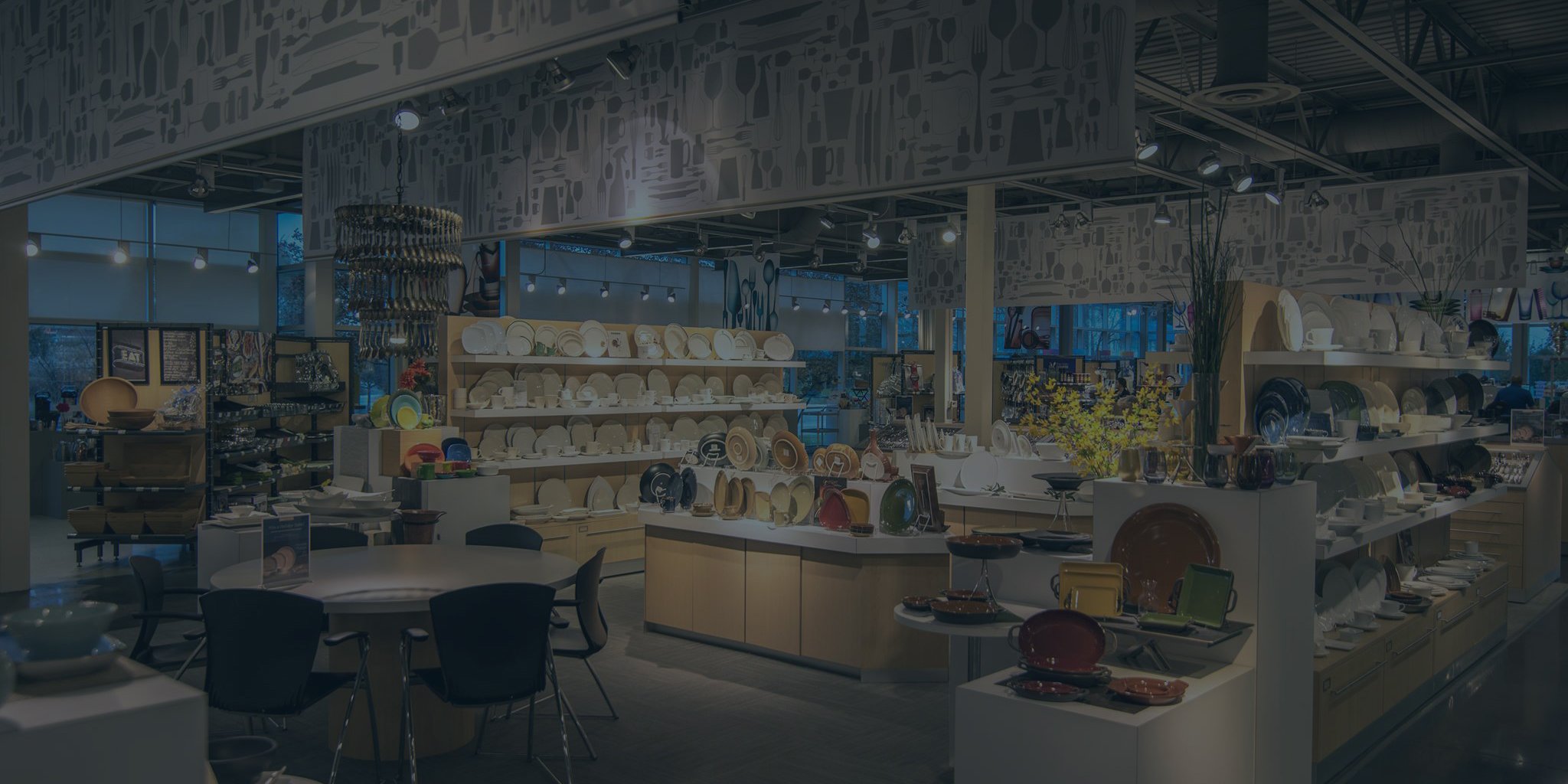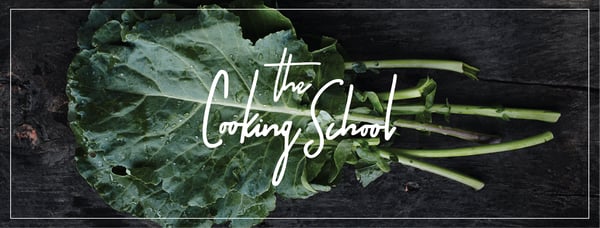In this episode of The Boelter Wire, Chef Michael Solovey returns to talk about some recent food trends affecting restaurants. He also provides helpful tips for restaurant owners and operators to consider as they evaluate their costs, discusses opportunities to increase efficiency and identifies the importance of waste management.
To learn from Chef Michael firsthand, sign up for an upcoming cooking class at our renowned Cooking School.
Excerpts
Leading up to this podcast, you pointed out that culinarians rarely have the time to study why a particular cooking method or ingredient is so popular. The perception is that they need to adapt or potentially be left behind, and that this often plays a huge role in their menu. So what do you think about that?
Michael Solovey: I think it is what it is. I think it is important to understand where we're coming from, to understand where we are and in some cases why we are where we are. But it's sometimes difficult for chefs to find time to do really anything aside from cook and concentrate on the business itself.
Sometimes when you fail to analyze that business, things can sneak up on you and all of a sudden you get caught in a bad situation. There's no way to set or measure a trend. Once that is identified as a food trend, how does it become certifiably trendy? Unfortunately, most of the time people that aren't in the industry dictate this and sometimes it drives people that are in the industry absolutely mad.
And like any other trend, food trends tend to change, often due to mainstream interaction. But is a trend different than a fad? Does one have more staying power than the other? I suppose only time tells us exactly what is truly valuable. Oftentimes we look back like, you know, hair in the 80s didn't make a whole lot of sense, but it sure was fun at the time. Food is no exception to that rule.
But I think it's also important to try to have fun while things are going on and put your own personal spin on things. Even though you might not necessarily agree with them, you've got to give the public what they want if you want to have a successful business.
The things that really do stand out in today's current trend-concentrated food market are things like plant-based foods, specialized food diets. Someone doesn't necessarily like the fact that they can't have gluten, but nonetheless they want to go out and have the entertainment of a restaurant. So it's important for us to respect these things, but to consider them in the greater picture of what it is that we are offering to our customers.
It can be good. You can adhere to these guidelines and bob and weave in an elegant way and do things well. This is an important detail, because what's happening with the relationship between the guests and the chef or the restaurateur who is designing this experience tailored to that guest is that we're all on the journey together. We're doing this together. Chefs don't necessarily anticipate or appreciate the fads that are going on, but they're involved in the process regardless, so we have to consider them.
I would say the same thing to a chef that is aggravated or frustrated that they have to adhere to dietary restrictions of many different people and varieties. It's a blessing in disguise, because it's making you look that much more closely at the food that you're eating, or serving in their case. You've got to analyze it, but you know that and that's just the way that the business goes to. You've got to keep your finger on the pulse, and you’ve got to keep two steps ahead because all of a sudden if you get too bogged down and get in the weeds, you're paying attention to all the wrong things and you get gobbled up and it's no good.
...
I'm sure we can both agree that establishing an interesting selection of menu options has got to be pretty important for a restaurant owner. But I imagine restaurant owners and operators are also concerned with controlling their food costs. Regardless of whether their current menu is a new trend or not, they still have to be aware of the cost associated.
Michael: It's probably the most important thing. It's not necessarily the most important aspect of having fun in the industry, but being able to forecast year round sales is absolutely critical.
My answer to this: Take notes, insane notes, meticulous notes on things and try to consider, like a detective would, as broad of a view as you possibly can. Imagine that even the smallest detail that you might not otherwise be thinking of can be affecting your business. Reviewing past sales and using that data to better predict sales in upcoming weeks or months or years. Read your notes. Don't just take them, but revisit them.
Of course, this is difficult with the calendar year because you know the exact date is not always going translate into your next sales day. A lot of restaurants are closed on Mondays; you're not going to do very well on that day, or whatever else it is.
But this comes back to understanding all of the things that are going on around you. A chef should be somebody who's listening to the news. A restaurateur should be somebody who is involved in social goings on around them. If you don't pay attention to these things, they might be affecting you in ways that you are completely unaware.
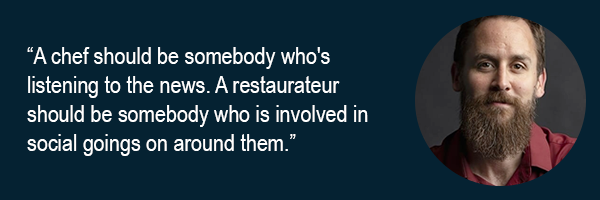 ...
...
You talk about taking a lot of notes and referencing those notes. What about integrating technology into that? Are there any software packages, apps, that chefs are using that help them to navigate those food costs?
Michael: In such a tech-centric society, I am amazed at myself to say no, there aren't a ton of options. They exist, but there's not a lot of competition in this field. Chefs are people like anybody else, and especially if they are up on current trends and trying to stay as up to date as possible in what's going on in the world around them, they're going to be tech savvy people. So technology can really help us in that way.
...
What else can we talk about in terms of food costs and how it's so important to manage?
Michael: It's important to manage because your assets, your expenditures are your money. If it's going out and not coming back in, that is a major problem. If you've got food waste, you're throwing food in the garbage.
This is a problem on a sort of epidemic level these days. We're starting to see a major shift in the industry where people are trying to be as eco-friendly as they possibly can be, making sure that they are not being wasteful and trying to decrease their carbon footprint, not just as individuals, but as establishments. A restaurant will do this. But also really trying to hone-in on the idea of understanding that we have to be seeking sustainability in any way that we can.
A chef cannot control their food costs 100%. A lot of times, you get thrown a curveball, but a chef that cannot control their costs at all is the chef that does not have job security. Who would have seen 10 years ago that there'd be a typhoon off the coast of Madagascar that would end up tripling the price of vanilla?
At the same time, you can see that, "Maybe I'm wasting too much of this, or I could be getting a better price or product buying locally opposed to going with big food distributors for everything." Which is difficult, because if you can go to one person for all or most of your ingredients, you're making your own job and life easier because everything is centralized, but you're also trying to control your costs. Most of the time, if you're buying in bulk, you're getting a better deal.
The answer to this is shopping around, analyzing. You've got to adapt. Keep in mind seasonal changes, holidays and community calendars, to forecast what's going on. This is going to help us–again, going back to those notes–eliminate menu items that aren't providing a solid return on investment with required ingredients. Oftentimes, more advantageous to just remove an item from a menu completely with the intention of reintroducing it later than to tweak or change a dish that your customers may have come to know.
...
Obviously, cutting costs is pretty important and it should be top of mind for any restaurant owner or chef. What about efficiency and the idea of running an efficient kitchen, how important is that?
Michael: Of course, keep in mind you're talking to a chef. Taking workflow technique and maximizing efficiency is, in my opinion, one of the more entertaining sides of the job. People talk a lot about the dance that chefs and cooks have in the kitchen, where it seems like we're dancing around each other, almost like synchronized swimmers. But that stuff comes in time.
A lot of times when people ask in the classes that we teach at the Boelter SuperStore, "How do you get good at getting all of your dishes to come together at the same exact time?" And my answer is, "Well, you know, do it day in and day out for 10+ years. You sort of learn that." But it doesn't have to be that way.
Things are based on this concept of mise en place, meaning "things in place" in French culinary terms. This is all your prep. So if you're taking a look at a recipe and you see that there's two main sections, like the first one is all your ingredients, the quantification of these ingredients, that would be your mise en place, and then the directions of what you're going to do next is the technique that you're going to use to execute the dish.
Mise en place happens to be–this is an interesting one to me–the most commonly tattooed phrase on any chef's body. You'll see a lot of chef knives and whisks and stuff like that. This is a neat one because mise en place is ... a way of living your life to say, "I am ready for what comes next. I've got my mental mise en place in order," so to say.
Having that preparation time, sitting down and thinking about what you're going to do before you do it is really, really important. And in a chef's world, this can be very, very difficult to do, because we're fly by the seat of our pants people. As much as we plan and have these ideas and we're trying to design our dishes and be creative in the process, we want to just jump in there and get our hands involved in the process. And we very rarely slow down enough to say, "Where should I be going? Where should I be taking this concept next?"
...
When I think of a kitchen in a very busy restaurant, I think of confined spaces behind the scenes and how that could also affect efficiency. If you are running a very popular restaurant and your kitchen is smaller, you're getting by, but are there any things that you can do to rearrange, to redesign?
Michael: Always keep your eye on that kitchen. You're going to have your subordinates running around you basically doing all the different tasks that they've already had and last minute things you're going to be throwing at them. And while this is going on, I think it's really, really important to be analyzing the efficiency of particular workstations.
A lot of people will open a restaurant and think, "Okay, I've designed it this way, and that's it. At least that part is done and now I can start to concentrate on other things." I disagree completely with that. I feel that the evolution of a kitchen in the way that it works, in the flow that it takes to get that work done, is a constant state of evolution. And if you lose track of that, you're going to see bottlenecks and problems will present themselves. Pay attention to it or it's going to come back to get you.
...
You started talking earlier about reducing waste as well, and reducing your overall footprint. What about the idea of the waste of food? Meals that are prepared that aren't eaten, food that's kept in the background in the kitchen that is maybe not stored properly?
Michael: Tantamount to sin in my opinion. In the industry, you see that it's common to have a family meal for everybody, but not everybody wants to eat at 10 or 11 at night when the restaurant closes down. That's why it's very important to take a proactive approach to this, because now it's not just about reducing that carbon footprint or trying to mitigate food waste. It also is a statement of who you are and what you represent as an organization to the general public. Now I'm not saying that there's somebody rummaging through the garbage after our shifts to see that we're not throwing things out, but the truth will out.
Sometimes you've got people going the route of using a company like Compost Crusader, which will come around and collect food waste for the sake of turning it into compost. Or it could just be something as simple as really sticking to FIFO–first in, first out. If you're getting something in, make sure that you're using the last of what you had before you open that new one up. When you're in the hustle and bustle of daily operations, sometimes it's difficult to do this ourselves, and even more difficult when you're making sure that your staff is doing that as well.
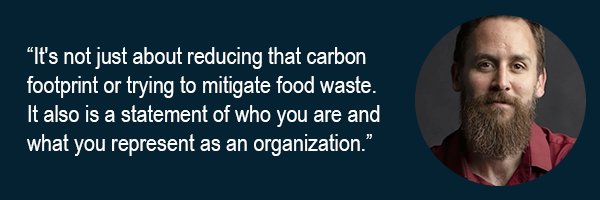 ...
...
I imagine this next subject might be a little bit more difficult to manage or identify, but the idea of reducing energy that a restaurant is using. If you're wastefully using energy, that’s going to increase your overall cost to run the restaurant. What can a chef, restaurant owner, do to better manage the amount of energy that they're using on a daily basis?
Michael: There's a lot, and it's one of the things that unfortunately falls by the wayside. We put it on the back burner as a priority, but anything from using Energy Star equipment, which uses a fraction of the energy that their competitors do, to simple things like making sure that you're turning the lights off when it's necessary. Or if you've got a piece of equipment that is running hot and it's next to a refrigeration unit, you're not maximizing the efficiency of this equipment, and you've got to treat it right.
The other end of that is maintenance. I can't tell you how many people I have run into, both when I was working directly in F&B and then also here at Boelter, that are like, "Oh my goodness, this piece of equipment went down last minute, and I need a new one immediately." And it's unfortunate that people get caught in these situations. We've all been there. It's going to happen, but there's usually some sort of an answer as to why this happened in the first place. I'm happy that people are coming to us and saying, "Hey, I need this thing today," because we're oftentimes there to say, "Okay, we have it. There you go. It's fine." But most of the time if people are really caring for the equipment, it doesn't happen in the first place.
Or they might have gotten the wrong piece of equipment. Maybe they didn't buy it at Boelter, or maybe they didn't have somebody come into the kitchen to say, "This piece of equipment needs to be used in this way. Here's how you maximize the efficiency, here's how you care for it, and here's what you don't put it next to. Here's how you don't use it." And all of that stuff. That would be unfortunate if someone didn't come to the right place to do that because they've got the resources all in one spot.
...
In terms of maintenance, is that ... Everybody's car should be maintained at X amount of miles and get your oil changed, check it every so often. Should [kitchen equipment] be looked at the same way? Regardless if you think it needs it or not, should it be routinely maintained?
Michael: Absolutely. Things need to be recharged. Filters need to be changed. It's very important to keep on a maintenance schedule. I generally like to recommend that people assign this to one person in their establishment or in the kitchen to make sure that we're keeping up on these things.
Car's a great example. You've got to have a caliper change for your brakes, when all that it really took was you staying and keeping up on getting those brake pads changed. That would have prevented this in the first place. I've seen it time and time again, and I have seen it cost establishments tens of thousands of dollars in these small mistakes.
...
You were talking about proper training. Some of that equipment is pretty big. It's very expensive. We were talking about technology earlier; some of these kitchen equipment are integrating technology. Is the expectation that there should be some formal or hands-on training after it's been installed? Or are you seeing more restaurant owners and chefs just buying equipment, installing it themselves, and figuring it out?
Michael: I think a lot of people do, unfortunately. But the people who are a little bit more savvy understand that tutorial on maintenance moving forward is worth its weight in gold.
It's far too often that you'll say, "This task of maintaining this deep fryer is Joe's job in the kitchen." And then, someday Joe gets an offer for a great job and he moves away. So somebody else comes into Joe's spot that was not necessarily trained on what Joe did. Again, the job market being so competitive right now, finding great people is as a major concern for most F&B establishments. But getting them actually trained to the level where they can work with autonomy and take care of our investments is another one.
What I would recommend, and what I have recommended in many situations consulting for restaurants in the past, is to have Joe write an SOP, get that Standard Operating Procedure down, so that when he does leave, he may not have to necessarily train somebody one on one, but he's got this manual, this maintenance schedule. He knows what needs to be done and that that's being communicated to the next person that's going to fill that spot.
...
Is there anything else that you wanted to bring up? Anything else you want to talk about?
Michael: I would just like to point out how important I feel that it is to listen to our staff, not only for the purpose of having really good feedback. Our staff, we hired them for the purpose of protecting our investment and performing a particular skill. But also, they're on the front line. They know what's going on and they're going to see details that we otherwise might not.
The other side of this is making sure that those people know that they have a home and are valued in this way. There are a lot of options out there for people these days. I don't think that there are many people in this industry that feel that they've got nowhere to go. When you have a bad day, as is going to naturally happen occasionally in this industry, a lot of people will make that big jump, without realizing that they were such an integral part of the development of a concept and the execution day by day of what that concept stands for.
So I do think it's important to give people the support that they need, make sure that they know that they are valued, but also to continue training. To give them something that incentivizes them to stay there and grow with you as a company. It's not just about the tasks that they have to do, but what they represent and what their role is and making sure that they feel that they're being fulfilled by this while also fulfilling the needs of the business.
Check out all of Chef Michael's upcoming classes here!
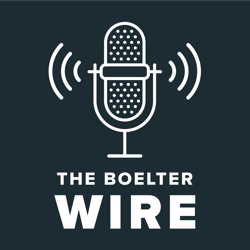
The Boelter Wire is an episodic podcast that focuses on thought-leadership conversations with industry experts and established partners, and is designed to help listeners evolve their business, stay competitive and pursue their passions.
Subscribe to The Boelter Wire here or on Spotify, Google Play, Apple Podcasts or Amazon Music.
.jpg?width=192&name=BLT_Only_Logo_Black%20(19).jpg)
